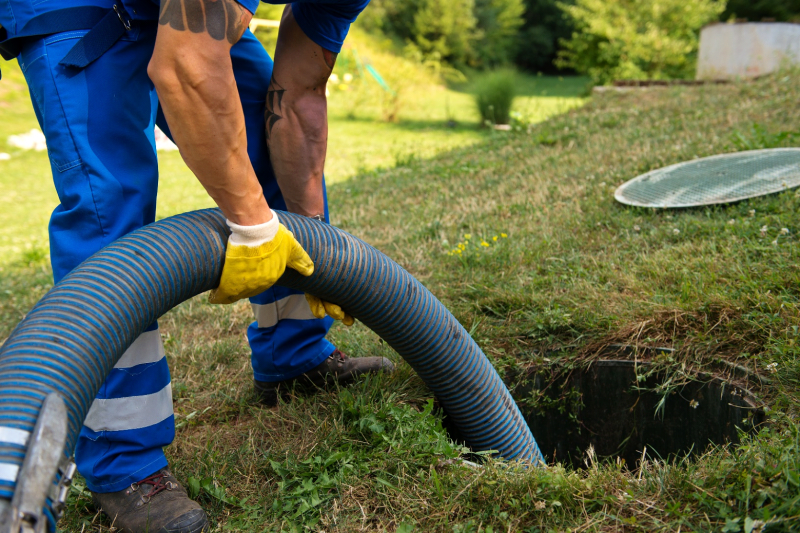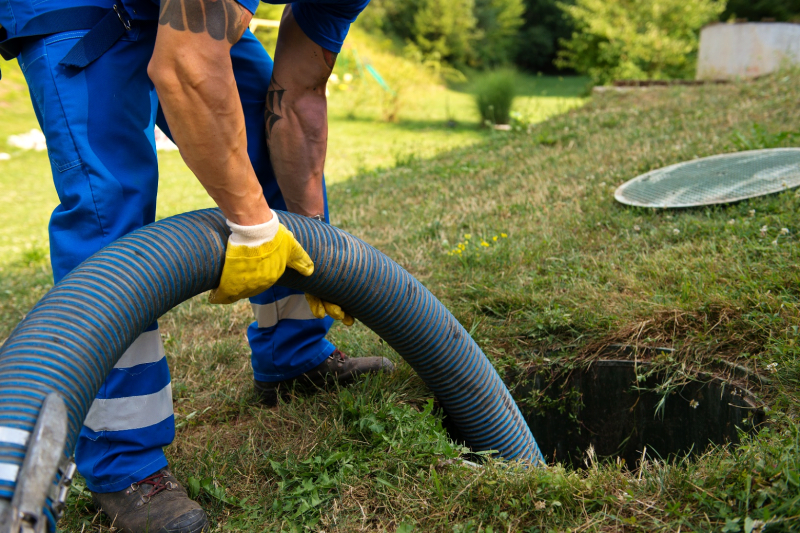Welcome! In this article, you will learn about the importance of regular septic tank cleaning and some tips for proper septic maintenance. Taking care of your septic system is crucial to prevent costly repairs and avoid any unpleasant issues. By understanding how often to get your septic tank cleaned and following some maintenance guidelines, you can keep your septic system running smoothly and efficiently.
When it comes to septic tank cleaning, the frequency depends on several factors such as the size of your tank, the number of people in your household, and the usage of water. On average, it is recommended to have your septic tank cleaned every 3-5 years. However, if you have a smaller tank or a larger household, you may need to schedule cleanings more frequently. It is important to keep in mind that regular maintenance is key to preventing any problems and prolonging the lifespan of your septic system. Additionally, there are some simple steps you can take to maintain your septic system such as conserving water, avoiding flushing harmful substances, and getting regular inspections. By following these tips, you can ensure the proper functioning of your septic tank and save yourself from potential headaches in the future.
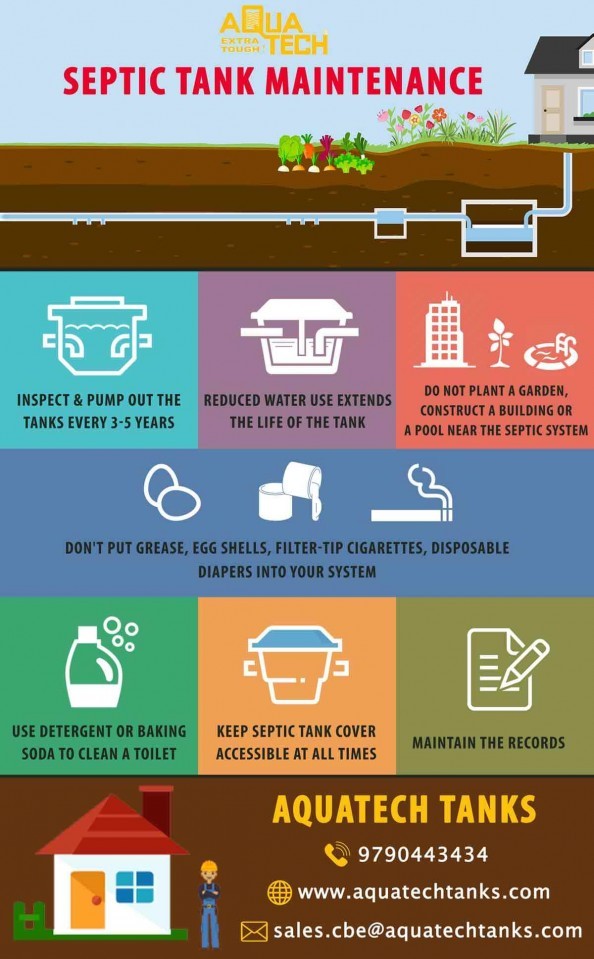
Understanding Septic Tanks
What is a septic tank?
A septic tank is an essential component of a home’s wastewater management system. It is an underground, watertight container made of concrete, fiberglass, or plastic that collects and treats the wastewater that flows from the household plumbing. Unlike homes connected to a public sewer system, septic tank systems are commonly used in rural areas or properties that are not linked to a municipal sewer line.
How does a septic tank work?
A septic tank works by separating solids from the wastewater and allowing the solid waste to settle at the bottom of the tank, forming a layer of sludge. The liquid waste, known as effluent, stays in the tank until it is released into the drain field, where it undergoes further treatment and drainage into the surrounding soil.
The septic tank is designed with compartments and baffles to facilitate the separation process. Bacteria and other microorganisms in the tank break down the solid waste, reducing its volume over time. However, the accumulated sludge needs to be periodically removed to ensure the effective operation of the septic system.
Why is proper septic tank maintenance important?
Proper septic tank maintenance is crucial for the longevity and functionality of the system. Neglecting septic tank maintenance can lead to costly repairs, system failures, and environmental contamination. Regular cleaning and appropriate care can prevent these issues and help homeowners avoid unnecessary expenses and inconveniences.
Determining Frequency of Cleaning
Factors to consider
Several factors influence the frequency at which a septic tank should be cleaned. The size of the tank, the number of household occupants, the volume of wastewater generated, and the presence of a garbage disposal unit all affect the rate of sludge accumulation. Additionally, the soil’s drainage capabilities and the use of additives or chemicals in the tank can impact the cleaning frequency.
Inspections and assessments
It is advisable to have a professional septic system inspection every three to five years, or whenever issues arise. During the inspection, the technician will assess the tank’s condition, measure the sludge and scum layer thickness, and determine if a cleaning is necessary. Regular inspections help identify potential problems early on and allow for proactive maintenance.
Typical timeline for septic tank cleaning
In general, septic tanks should be cleaned every three to five years, depending on the factors mentioned above. However, this timeline is merely a guideline, and individual cases may vary. Some homes may require more frequent cleanings, such as those with a smaller tank or higher water usage. Others may be able to extend the cleaning interval if they practice water conservation and proper septic system maintenance.
Signs That Your Septic Tank Needs Cleaning
Foul odors
One of the first signs that your septic tank needs cleaning is the presence of foul odors around the house or in the yard. If you notice unpleasant smells, especially near the drains or septic tank area, it may indicate that the tank is full and needs to be pumped.
Slow draining fixtures
If sinks, toilets, or showers in your home are slow to drain, it could be a sign of a clogged drain or a full septic tank. When the tank reaches capacity, it can no longer effectively process the wastewater, leading to backups and slow drainage.
Backups or blockages
Experiencing backups or blockages in your plumbing system is a clear indication that your septic tank requires immediate attention. These issues occur when the tank is overloaded with solids and cannot properly handle the volume of wastewater. Acting promptly can prevent further damage and costly repairs.
Benefits of Regular Septic Tank Cleaning
Prevention of system failures
Regular septic tank cleaning helps prevent system failures and the need for significant repairs. When a septic tank becomes overloaded with sludge and scum, it can lead to blockages, backups, and damage to the drain field. Routine maintenance avoids these issues by keeping the tank operating at optimal capacity.
Avoidance of costly repairs
Dealing with septic tank problems can be expensive, especially when they lead to damage that requires repairs or replacements. By investing in regular cleaning, homeowners can save money in the long run and avoid the high costs associated with system failures.
Protection of the environment
Proper septic tank maintenance is not only beneficial for the homeowner but also for the environment. A well-maintained septic system prevents the release of untreated wastewater into the soil and nearby water sources, reducing the risk of groundwater contamination and the spread of waterborne diseases.
Septic Tank Maintenance Tips
Proper use of water and chemicals
To maintain a healthy septic system, it is essential to use water efficiently and avoid excessive water usage. Repair leaky faucets and toilets promptly and consider installing low-flow fixtures to conserve water. Additionally, avoid flushing harmful chemicals or substances down the drain, as they can disrupt the bacterial balance in the tank and hinder the treatment process.
Avoiding excessive disposal of solids
Septic tanks are designed to handle human waste, toilet paper, and water. Avoid disposing of items such as feminine hygiene products, diapers, wipes, grease, or excessive food waste in the septic system. These materials can clog the system and lead to costly repairs.
Regular septic system inspections
Schedule regular inspections of your septic system with a professional technician. These inspections can identify any issues early on and allow for timely repairs or maintenance. Additionally, professionals can provide advice on proper system care and answer any questions you may have about your septic tank.
Professional vs. DIY Cleaning
Pros and cons of hiring a professional
Hiring a professional septic tank cleaning company offers several benefits. Professionals have the experience, knowledge, and equipment required to perform thorough cleanings and ensure the proper disposal of the waste. They can also identify potential problems during the cleaning process, allowing for proactive maintenance.
However, professional cleanings can be expensive, depending on the size of the tank and the extent of the sludge accumulation. Some homeowners may choose to tackle the task themselves, but it is vital to consider safety measures and follow proper waste disposal guidelines.
Safety considerations for DIY cleaning
If you decide to clean your septic tank yourself, take necessary precautions to protect your health and safety. Wear protective clothing and gloves, avoid inhaling fumes, and be mindful of potential hazards in the tank or drain field area. It’s also crucial to follow local regulations regarding the disposal of septic waste.
Availability of local septic tank cleaning services
When it comes to septic tank cleaning, it is advisable to hire a reputable, local company. Ask for recommendations from neighbors or friends who have septic tanks, or search for reliable service providers online. Read reviews and check for licenses and certifications to ensure the company meets quality standards.
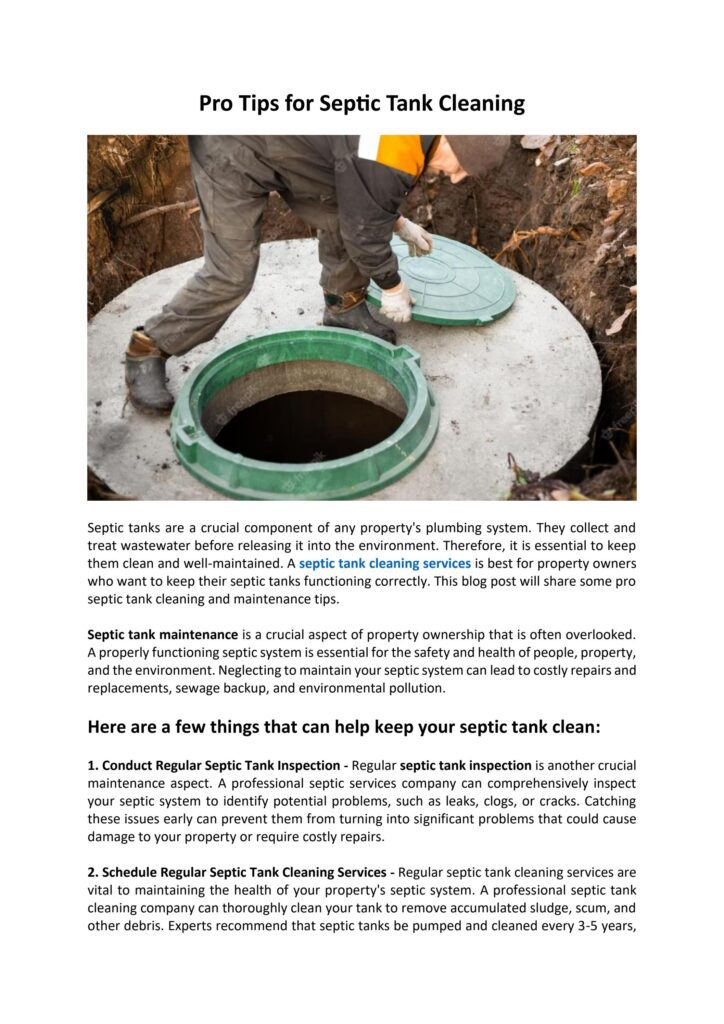
Factors Affecting Cleaning Costs
Size of the septic tank
The size of your septic tank is a significant factor that affects the cost of cleaning. Larger tanks require more time, labor, and disposal fees, resulting in higher overall costs. Conversely, smaller tanks may be less expensive to clean.
Location and accessibility
The location and accessibility of your septic tank can also impact the cleaning costs. If the tank is located in a challenging or hard-to-reach area, it may require additional time and effort for cleaning, resulting in increased expenses.
Extent of sludge accumulation
The amount of sludge accumulated in your septic tank will determine the cleaning requirements and, subsequently, the cost. If the tank has not been regularly maintained, resulting in excessive sludge buildup, it may require extra cleaning cycles or additional services, increasing the overall cost.
Choosing a Reliable Septic Tank Cleaning Company
Local recommendations
When selecting a septic tank cleaning company, seek recommendations from local residents or friends who have had positive experiences with a particular service provider. Local recommendations often provide insights into the company’s reliability and professionalism.
Licenses and certifications
Ensure the septic tank cleaning company you choose holds the necessary licenses and certifications required by your state or local regulatory authority. These credentials indicate that the company meets specific industry standards and adheres to proper waste disposal practices.
Reviews and customer feedback
Research the company’s reputation by reading online reviews and testimonials from previous customers. Positive customer feedback is a good indicator of the company’s reliability and quality of service. Avoid companies with consistently negative reviews or unresolved complaints.
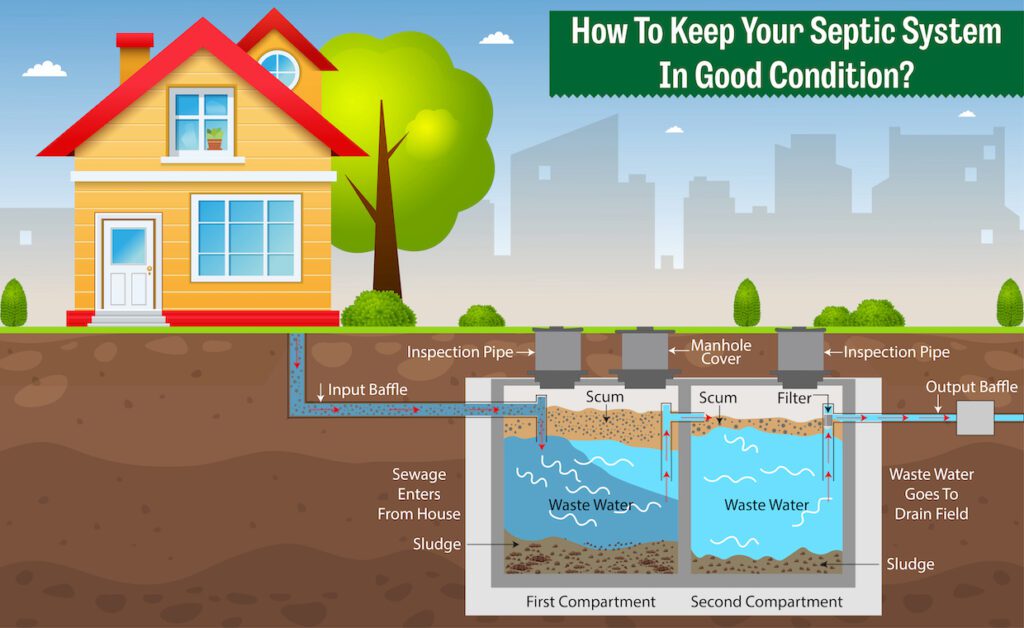
Proper Waste Disposal
Do’s and don’ts of septic tank waste disposal
To maintain a healthy septic system, follow these do’s and don’ts of septic tank waste disposal:
- Do use water efficiently and practice water conservation.
- Do dispose of human waste and toilet paper only.
- Do use septic-safe cleaning products and avoid harsh chemicals.
- Don’t flush non-biodegradable items, grease, oil, or excessive food waste.
- Don’t pour chemicals, medications, or hazardous substances down the drain.
Environmentally friendly alternatives
Consider implementing environmentally friendly practices to reduce the burden on your septic system. Use natural cleaners, recycle graywater for irrigation, and consider composting food waste instead of using the garbage disposal unit. These alternatives can help minimize the load on your septic tank and contribute to a more sustainable lifestyle.
Educating household members
Ensure that all household members are aware of proper septic system care and waste disposal practices. Educate everyone about the do’s and don’ts to prevent accidental damage or misuse of the septic system. Emphasize the importance of regular maintenance and the impact it has on the system’s performance and longevity.
Conclusion
In conclusion, regular septic tank cleaning and proper maintenance are essential for the effective operation of your septic system. By understanding the factors that influence cleaning frequency, recognizing signs that indicate a need for cleaning, and implementing septic tank maintenance tips, you can ensure the health and longevity of your system.
Remember to consider professional cleaning services for larger tanks or difficult-to-reach locations, and always hire a reputable company. Follow proper waste disposal guidelines, prioritize eco-friendly alternatives, and educate household members to maintain a healthy and efficient septic system. By investing in regular cleaning and proper septic tank maintenance, you can avoid costly repairs, prevent system failures, and protect both your home and the environment.
